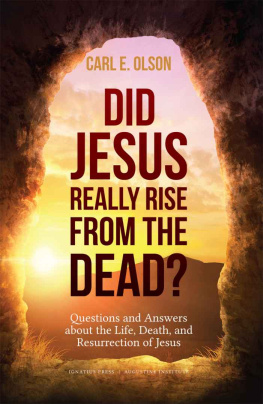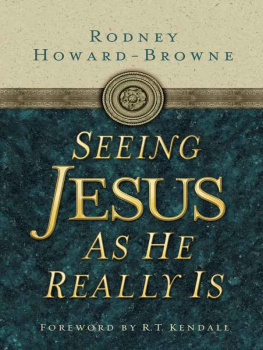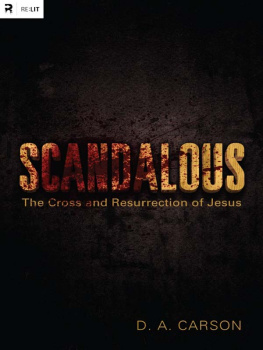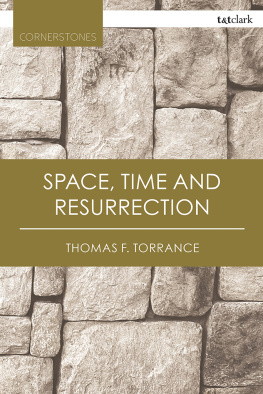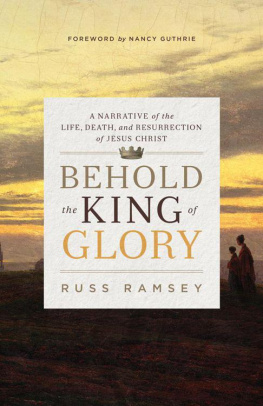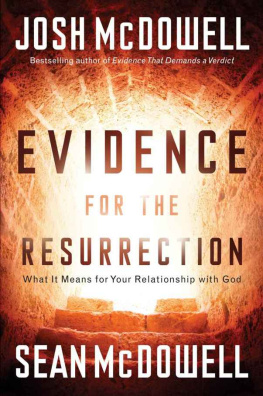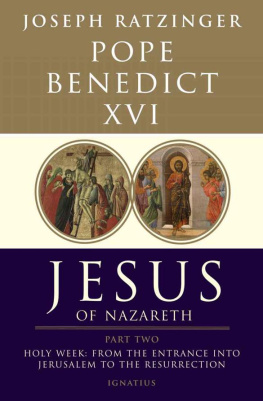Did Jesus Really Rise
from the Dead?
Questions and Answers
about the Life, Death, and
Resurrection of Jesus Christ
Carl E. Olson
Ignatius Press-Augustine Institute
San Francisco Greenwood Village, CO
Ignatius Press Distribution
P.O. Box 1339
Fort Collins, CO 80522
Tel: (800) 651-1531
www.ignatius.com
Augustine Institute
6160 S. Syracuse Way, Suite 310
Greenwood Village, CO 80111
Tel: (866) 767-3155
www.augustineinstitute.org
All Scripture contained herein is from the
Revised Standard Version, Second Catholic Edition
2000 and 2006 by the Division of Christian Education of the National Council
of the Churches of Christ in the
United States of America. All rights reserved.
Cover Design: Jessica Hallman
Cover Art: Empty Tomb , Kevron2001, Adobe Stock
Copyright 2016, Ignatius Press-Augustine Institute.
ISBN: 978-1-62164-120-9(PB)
ISBN 978-1-68149-719-8 (EB)
All rights reserved.
Printed in the United States of America
Contents
Introduction
From the start, the proclamation of the Resurrection of Jesus Christ from the dead has been met with a wide range of emotions and responses: fear, amazement, joy, perplexity, astonishmentand disbelief. In the succinct account at the end of the Gospel of Mark, the three women, Mary Magdalene, Mary the mother of James, and Salome, who go to anoint Jesuss body with spices were amazed to find a young man in white robes, an angel, sitting in an otherwise empty tomb. Do not be amazed, he told them, you seek Jesus of Nazareth, who was crucified. He has risen, he is not here; se the place where they laid him (Mk 16:6). The women fled the tomb, trembling and astonished, and they said nothing to any one, for they were afraid (Mk 16:8).
So afraid, we read, that they said nothing to anyone. Who would believe them? Why would anyone believe them? And, sure enough, when Mary Magdalene told the grieving disciples that Jesus had appeared to her the following morning, they would not believe it (Mk 16:11). In the words of Luke, the account given seemed to them an idle tale, and they did not believe them (Lk 24:11). For the early Christians, writes noted New Testament scholar Craig S. Keener, neither the empty tomb nor the testimony of the women was adequate evidence by itself (cf Lk 24:22-24); they also depended on the testimony of the men for the public forum (cf 1 Cor 15:5-8). The disbelief of the male disciples is, by any measure, both understandable and embarrassing, and Keener states that the criterion of embarrassment indicates that no one had apologetic reason to invent the testimony of these women.
The most famous story of early disbelief, of course, is Johns account of doubting Thomas
So the other disciples told him, We have seen the Lord. But he said to them, Unless I see in his hands the print of the nails, and place my finger in the mark of the nails, and place my hand in his side, I will not believe. (Jn 20:25)
There has been much commentary on this story, but the point here is simply that from the beginningthat is, from the moment that something happened in the tomb in the Gardenthere has been disbelief, even among those who lived and walked with Jesus. Further, the early Christians did not apparently spend time proclaiming first and foremost the teachings and parables of Jesus, but rather focused on his rising from the dead. And, again, its noteworthy how often this message was not only rejected but inspired scorn, disdain, and even persecution.
Peter, in his sermon at Pentecost, stated:
Men of Israel, hear these words: Jesus of Nazareth, a man attested to you by God with mighty works and wonders and signs which God did through him in your midst, as you yourselves knowthis Jesus, delivered up according to the definite plan and foreknowledge of God, you crucified and killed by the hands of lawless men. But God raised him up, having loosed the pangs of death, because it was not possible for him to be held by it. (Acts 2:22-24; cf . 2:27, 31)
This was not just part of a rather sophisticated theological argument for Jesuss messianic identity and divine nature but was at the very center of that argument, as emphasized by the head Apostle: This Jesus God raised up, and of that we all are witnesses (Acts 2:32). Not too many days later, Peter addressed a group of people gathered near the Temple and repeated similar words: But you denied the Holy and Righteous One, and asked for a murderer to be granted to you, and killed the Author of life, whom God raised from the dead. To this we are witnesses (Acts 3:14-15).
As we will see, witnessmartyria in the Greek (from which comes the word martyr)and testimony are important terms for the authors of the New Testament books. This is especially true for John, who uses the word twenty-six times in his Gospel (it also appears seven times in the Synoptic Gospels and six times in the Book of Revelation). Peter, at the start of his first epistle, emphasizes the living hope the early Christians held on to through the resurrection of Jesus Christ from the dead (1 Pet 1:3), and later situates his authority, at least in part, on being a witness of the sufferings of Christ as well as a partaker in the glory that is to be revealed (1 Pet 5:1). The significance of being a witness to the Resurrection is highlighted at the beginning of the Acts of the Apostles, as the Eleven go about choosing a replacement for Judas:
So one of the men who have accompanied us during all the time that the Lord Jesus went in and out among us, beginning from the baptism of John until the day when he was taken up from usone of these men must become with us a witness to his resurrection. (Acts 1:21-22)
But, again, not everyone accepted the witness of the Apostles. While Luke, in Acts of the Apostles, emphasizes the growth and expansion of the early Church ( cf . Acts 2:47, 4:4, 6:1, 7, 11:21, 16:5), he also depicts both Jews and Greeks rejecting the message preached by the Apostles precisely because of the Resurrection. The priests and the Sadducees came upon them, annoyed because they were teaching the people and proclaiming in Jesus the resurrection from the dead (Acts 4:1-2). In Pauls address to the Athenians at the Areopagus (or Mars Hill), which was a place for juridical deliberation and philosophical debate, the point of division was not the existence or nature of God or points of morality but the Christian belief in Jesuss victory over death. Paul says,
because he [God] has fixed a day on which he will judge the world in righteousness by a man whom he has appointed, and of this he has given assurance to all men by raising him from the dead.Now when they heard of the resurrection of the dead, some mocked; but others said, We will hear you again about this. (Acts 17:31-32)
And it is Paul who put the matter in stark relief, telling the Christians in Corinth that what he preached and what they believed was centered squarely on the Resurrectionand doing so, it seems, because of a failure of some to believe such an event was real:
Whether then it was I or they, so we preach and so you believed. Now if Christ is preached as raised from the dead, how can some of you say that there is no resurrection of the dead? But if there is no resurrection of the dead, then Christ has not been raised; if Christ has not been raised, then our preaching is in vain and your faith is in vain. We are even found to be misrepresenting God, because we testified of God that he raised Christ, whom he did not raise if it is true that the dead are not raised. For if the dead are not raised, then Christ has not been raised. If Christ has not been raised, your faith is futile and you are still in your sins. (1 Cor 15:11-17)
In the words of Pope Benedict XVI, in his second book on Jesus of Nazareth: The Christian faith stands or falls with the truth of the testimony that Christ is risen from the dead. The Resurrection of the Christ is, to put it simply, the event that divides. And today, some 2,000 years after Christ walked the earth, it divides in at least three important ways.

